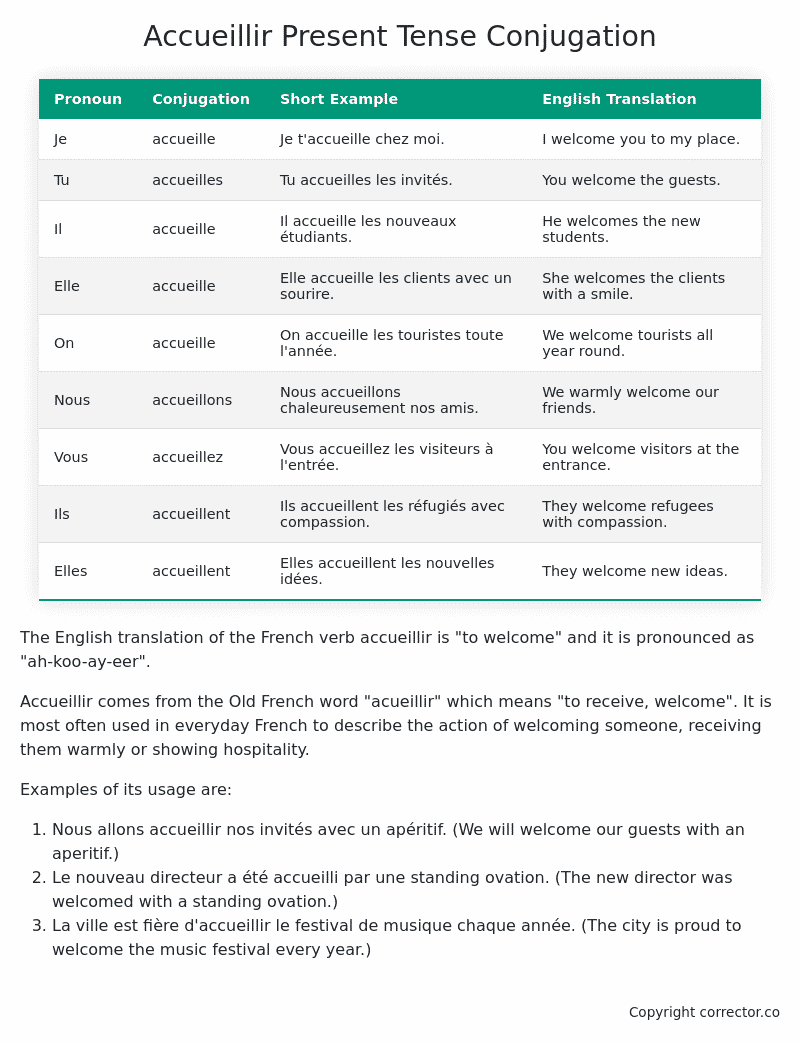Le Present (Present Tense) Conjugation of the French Verb accueillir
Introduction to the verb accueillir
The English translation of the French verb accueillir is “to welcome” and it is pronounced as “ah-koo-ay-eer”.
Accueillir comes from the Old French word “acueillir” which means “to receive, welcome”. It is most often used in everyday French to describe the action of welcoming someone, receiving them warmly or showing hospitality.
Examples of its usage are:
- Nous allons accueillir nos invités avec un apéritif. (We will welcome our guests with an aperitif.)
- Le nouveau directeur a été accueilli par une standing ovation. (The new director was welcomed with a standing ovation.)
- La ville est fière d’accueillir le festival de musique chaque année. (The city is proud to welcome the music festival every year.)
Accueillir – About the French Present Tense
To take a deep dive into all the French tenses then see our article on Mastering French Tense Conjugation.
Common Everyday Usage Patterns For Le Present
Interactions with Other Tenses
Table of the Present Tense Conjugation of accueillir
| Pronoun | Conjugation | Short Example | English Translation |
|---|---|---|---|
| Je | accueille | Je t’accueille chez moi. | I welcome you to my place. |
| Tu | accueilles | Tu accueilles les invités. | You welcome the guests. |
| Il | accueille | Il accueille les nouveaux étudiants. | He welcomes the new students. |
| Elle | accueille | Elle accueille les clients avec un sourire. | She welcomes the clients with a smile. |
| On | accueille | On accueille les touristes toute l’année. | We welcome tourists all year round. |
| Nous | accueillons | Nous accueillons chaleureusement nos amis. | We warmly welcome our friends. |
| Vous | accueillez | Vous accueillez les visiteurs à l’entrée. | You welcome visitors at the entrance. |
| Ils | accueillent | Ils accueillent les réfugiés avec compassion. | They welcome refugees with compassion. |
| Elles | accueillent | Elles accueillent les nouvelles idées. | They welcome new ideas. |
Other Conjugations for Accueillir.
Le Present (Present Tense) Conjugation of the French Verb accueillir (this article)
Imparfait (Imperfect) Tense Conjugation of the French Verb accueillir
Passé Simple (Simple Past) Tense Conjugation of the French Verb accueillir
Passé Composé (Present Perfect) Tense Conjugation of the French Verb accueillir
Futur Simple (Simple Future) Tense Conjugation of the French Verb accueillir
Futur Proche (Near Future) Tense Conjugation of the French Verb accueillir
Plus-que-parfait (Pluperfect) Tense Conjugation of the French Verb accueillir
Passé Antérieur (Past Anterior) Tense Conjugation of the French Verb accueillir
Futur Antérieur (Future Anterior) Tense Conjugation of the French Verb accueillir
Subjonctif Présent (Subjunctive Present) Tense Conjugation of the French Verb accueillir
Subjonctif Passé (Subjunctive Past) Tense Conjugation of the French Verb accueillir
Subjonctif Imparfait (Subjunctive Imperfect) Tense Conjugation of the French Verb accueillir
Subjonctif Plus-que-parfait (Subjunctive Pluperfect) Tense Conjugation of the French Verb accueillir
Conditionnel Présent (Conditional Present) Tense Conjugation of the French Verb accueillir
Conditionnel Passé (Conditional Past) Tense Conjugation of the French Verb accueillir
L’impératif Présent (Imperative Present) Tense Conjugation of the French Verb accueillir
L’infinitif Présent (Infinitive Present) Tense Conjugation of the French Verb accueillir
Struggling with French verbs or the language in general? Why not use our free French Grammar Checker – no registration required!
Get a FREE Download Study Sheet of this Conjugation 🔥
Simply right click the image below, click “save image” and get your free reference for the accueillir Present Tense tense conjugation!

I hope you enjoyed this article on the verb accueillir. Still in a learning mood? Check out another TOTALLY random French verb present conjugation!


